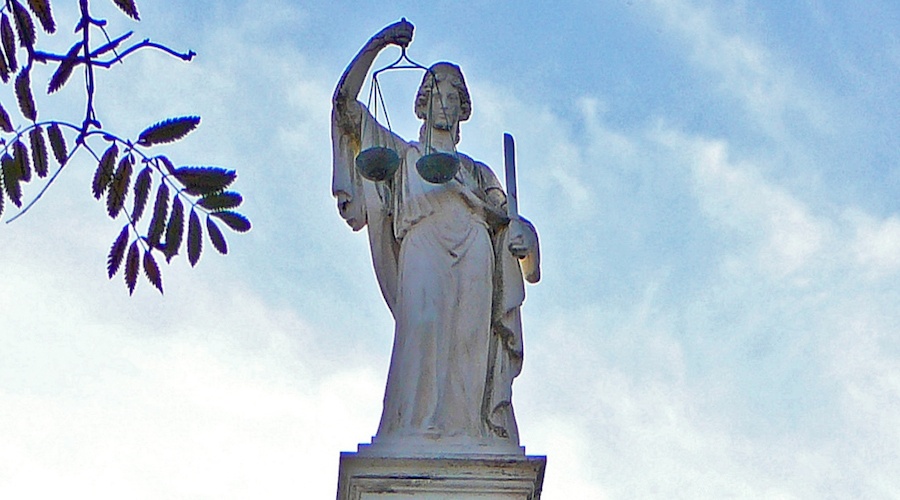How Tunisia could be the next hub for justice entrepreneurs

What if Tunisia was a better place to live in with more justice startups? The question was asked by Hiil, a Netherlands-based nonprofit social enterprise, which provides an acceleration program for startups innovating in justice. Hiil also conducts surveys related to the needs and the satisfaction rates of users of the justice system, including access to lawyers, legal procedures, and litigation of conflicts, etcetera.
Connor Sattely, Hiil’s business acceleration agent, visited on July 28 Tunisia’s coworking space Cogite, to present the company's last survey: Justice Needs in Tunisia - 2017. The document revealed data about justice in Tunisia, compiled following interviews of 6,700 Tunisians during 2016: 41 percent of respondents said they confronted with one or more legal problems over the past four years.
“Why for us, the timing is right for a wave of justice innovation in Tunisia? Because the right high level people are supportive,” said Sattely. He explained that they got to the support of the Minister of Justice and the Nation Bar Association of Tunisia.
He said that Hiil is helping first movers with an equity free funding, tickets for 20,000 euros (about US$ 23,000).
The data provided by the report details the justice needs of local Tunisians such as solving issues related to employment. These include unpaid employees and harassments, which are the highest rate injustice the report highlighted (up to 31 percent). Other needs also include public services (18 percent) and neighbor issues (15 percent). The data also reveals that 80 percent of Tunisians don’t consult with an attorney when confronting a legal issue, and that they would rather try to litigate in an informal way.
“Most of these statistics highlight the needs and bolster entrepreneurs to address those needs,” added Sattely who lined up several examples of justice startups that Hiil supported in other countries. Startups include Dubai-based Legal Advice Middle East, a platform that provides legal help for foreigners in Dubai in English, Legal Alarm in Ukraine and MSME Garage in Uganda, both anti-police harassment apps, and Five-O, a police transparency app in Atlanta, US. Hiil also supports a platform in Switzerland that helps people connect with their elected officials and advocate the policies they believe in.
“Several entrepreneurs are creating startups that address the need for justice but just don’t call their ventures ‘justice startups’. Community mediation for instance, is an example of how startups are trying to solve a problem locally and dealing with justice,” he said.
Hiil’s mission is to enable 150 million people worldwide to prevent or solve their most pressing justice problems by 2030.

Sustainability and underground coalition
The general mistrust in the judiciary system, the slowness of the procedures, and the corruption issue, were additional problems addressed in the report and by the audience. How can a startup work under such circumstances?
“You have to build up underground. For the first six months, you work on a network of media outlets and people who will support you,” said Sattely arguing that Hiil is open to support underground initiatives and provide some protection for startups willing to take on issues such as police harassment or corruption.
Hiil is calling for a global application in its acceleration program, and is pushing for Tunisians to apply inspired by the data the report brought, which could inspire a wide plethora of ideas.
Every Tunisian entrepreneur with an innovative idea can apply until July 4.
Some young entrepreneurs who participated in an introductory hackathon organized by Hiil earlier in 2017, believe the opportunity to change things is there but there are so many things to deal with.
“The report gave us the statistics we needed to prioritize [a category], because we are all aware about injustice issues, but we did not know which one was the highest,” said Rebecca Gluhbegovic, office manager at the Tunisian Center of Social entrepreneurship in Mahdia.
She and her team that involves, a law student, an engineer, and a dentist, are going to apply to Hiil’s acceleration program with the idea of a platform that would gather, visualize and simplify every law data in Tunisia, through a comic book or a game. “The interesting part is that when we brainstormed this, we realized that teams in Sidi Bouzid and Kasserine (two Tunisian more central-west towns ) had the same thing in mind, which accentuates the need for it, and its potential,” said the law student Norhene M’sakni.
Other entrepreneurs participating in the event are already part of firms that are indirectly dealing with legal access. Adnen Belhaj for instance works in a firm that takes care of the legal procedures ones go through when creating a startup or an NGO, solving them within a week for the first, and two months for the second.
“We came to get ideas about how to digitize our services, and to find sources to fund them,” he said after the event.
“Globally, justice innovation is the trend you have not heard of but I am sure that we will see some great things happening here in Tunisia in a few years,” said Sattely. Hiil is focusing now on the Middle East and Africa and will conduct this year a study on justice needs in Lebanon.


